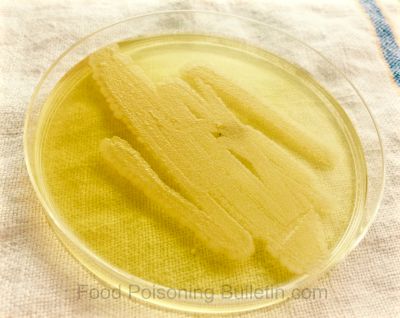The U.S. Army is developing a handheld inspection tool to increase food safety for soldiers. The Natick Soldier Research, Development, and Engineering Center is making a small, sensitive, hand-held device that will “both capture and detect dangerous pathogens that can cause food-related illness.”
 Scientists at the Natick Center are collaborating with the FDA, Winchester Engineering and Analytical Center, and the Massachusetts Institute of Technology after receiving a 2013 FDA leveraging and collaboration award. The award is for “Designing Handheld Resistance Based Biosensors Utilizing Conducting Nonwoven Fibers for In-Field Microbial Pathogen Detection.”
Scientists at the Natick Center are collaborating with the FDA, Winchester Engineering and Analytical Center, and the Massachusetts Institute of Technology after receiving a 2013 FDA leveraging and collaboration award. The award is for “Designing Handheld Resistance Based Biosensors Utilizing Conducting Nonwoven Fibers for In-Field Microbial Pathogen Detection.”
Since food safety is critical to combat readiness, this tool will reduce the danger faced by troops. Andre Senecal, one of the scientists in the project said in a statement, “military operations at some overseas locations where food is procured locally and food safety laws are lenient, are especially problematic. Soldiers can lose a lot of time from work because they get sick from pathogens present in water and food. We are starting our work with E. coli O157:H7, but the goal is to look at all microbial pathogens and toxins they produce.” The leading cause of illness among troops is gastroenteritis, and one of the primary causes is the E. coli bacterium.
The tool works because bacteria impede the flow of electricity from one side to the other. This change in the electrical connection indicates the presence sod pathogens. Current methods for detecting bacterial pathogens use heavy and cumbersome equipment such as tubing and reagents. The device will also be reusable, and the detection membranes disposable. The biosensor concentrates pathogens, eliminating the need to grow bacteria before testing.
Conductive polymers will be put on nano fibers, which work well at detection. Kris Senecal, another scientists working on the project said, “nano fibers are one-billionth of a meter and nano materials are cheap, one-use, and super lightweight.” The scientists also say that this technology can be used elsewhere after it is developed.





This is really cool. I hope that they further develop it and make it commercially available at a reasonable price.
VERY COOL! This health inspector wants one.